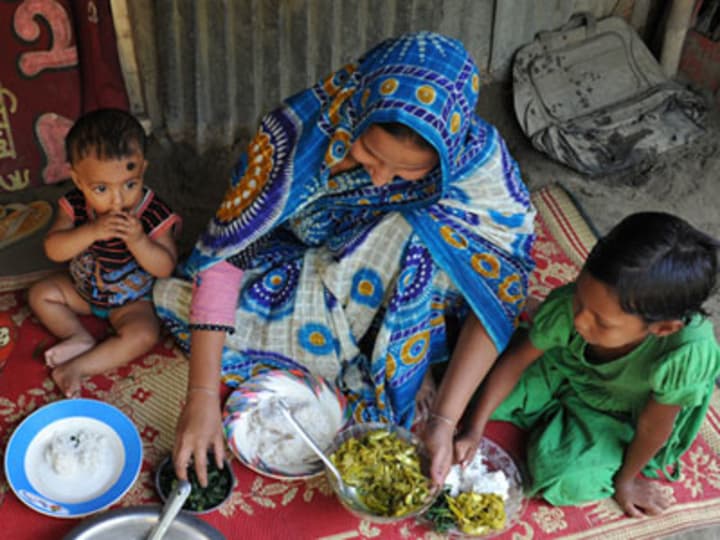
In a small village in Bangladesh, Ruma prepares the midday meal for her three young children, husband and mother-in-law. She boils a pot of rice, cooks a curry made from small fish called mola, and heats a mixed vegetable curry over the wood fire.
The vegetables were grown in her homestead garden and along the banks of the family’s small pond, where the mola were raised together with carps. She takes some of the fish curry and mashes it on the kitchen grinding stone, mixing it with a little of the vegetable curry and some rice to feed her infant son.
After speaking with NGO workers in her village, Ruma now knows that her 18-month-old son will grow stronger, healthier and smarter if he is fed a nutritious diet of vegetables and fish, and not just rice.
Ruma’s story is common throughout Bangladesh, where infants are traditionally fed small amounts of a thin porridge made from rice powder.
Malnutrition’s effects on children
At around 6 months of age, when breast milk alone can no longer give babies the energy and nutrients they need, parents must complement breastfeeding with small amounts of nutritious family foods. Without complementary feeding, or by giving the child a meal of rice porridge that lacks nutritional value, the child will become malnourished, and have poor growth and development.
Malnutrition at this young age has an irreversible effect on children’s brain development and cognition, which cannot be compensated for later in life. This will hinder their learning at school, and as they grow older, their performance and productivity at work, ultimately effecting not just them but the country’s national development.
“In the past, we gave our children only thin rice porridge, together with breast milk, until one year of age. Now we know that we should be giving them many different foods, from six months of age. We can do this if we have fish and vegetables in our homestead, and if we have money to buy sufficient quantities from the market,” says Ruma’s mother-in-law.
Dr. Shakuntala Thilsted, senior nutrition scientist at WorldFish, has worked with families in Bangladesh for more than 25 years, and says that there is an important window of opportunity to try and improve complementary feeding practices in the country.
“Complementary feeding is a challenge for many families throughout Bangladesh, for a variety of reasons. They may not have the money to buy sufficient food for the family, and many households do not have the facilities to store cooked foods,” she explains.
“Hygiene and sanitation practices are also poor , and many parents do not wash their hands with soap before handling food and feeding their children,” adds Dr. Thilsted.
Mothers face daily challenges
Mothers like Ruma often have heavy workloads that mean they are unable to care, cook for and feed their children properly. This duty often falls on other family members like Ruma’s mother-in-law. “I have to take care of my grandchild a lot, as his mother is busy with household work and taking care of the garden,” she says.
Millions of mothers across Bangladesh face these daily challenges to feed their families, and this is reflected in the country’s most recent demographic and health survey from 2011, which showed that crucial nutrition indicators for Bangladesh are still very poor. The survey revealed that 41 percent of children under five years old are moderately stunted, over 1 in 3 children are underweight, and 14 percent are wasted. The infant mortality rate is also concerning; for every 1,000 live births, 53 children will die.
While there are many complex issues that underpin these statistics, Dr. Thilsted believes that a difference can be made by working on infant and young child feeding practices with communities. “We can help families to adopt essential nutrition and hygiene actions, which together with access to micronutrient-rich small fish, and vegetables like green leafy vegetables and orange sweet potato will help families to raise healthy, strong and smart children,” she explains.
While we celebrate our mothers on this special day, we’re reminded of the difficulties and hardships that mothers like Ruma around the world overcome to make a better life for their children.
Join the Devex community and access more in-depth analysis, breaking news and business advice — and a host of other services — on international development, humanitarian aid and global health.
